Analyzing Unilever's Ethical and Philanthropic CSR Strategies
VerifiedAdded on 2023/06/05
|15
|2862
|56
Report
AI Summary
This report provides an analysis of Unilever's Corporate Social Responsibility (CSR) initiatives, focusing on its ethical and philanthropic practices, particularly in India and Bangladesh. It examines the company's CSR strategies through the lens of Carroll's CSR pyramid, highlighting the importance of economic, legal, ethical, and philanthropic responsibilities. The report identifies key ethical and philanthropic issues Unilever addresses, such as healthcare accessibility in developing regions, and proposes CSR strategies like mobile hospitals to tackle these challenges. It also details the company's management and campaign structure for implementing CSR initiatives, analyzes stakeholder engagement, and discusses potential barriers to change along with strategies to overcome them using Lewin's change management model. The report concludes by emphasizing the significance of CSR in achieving sustainable social development and enhancing Unilever's corporate image.
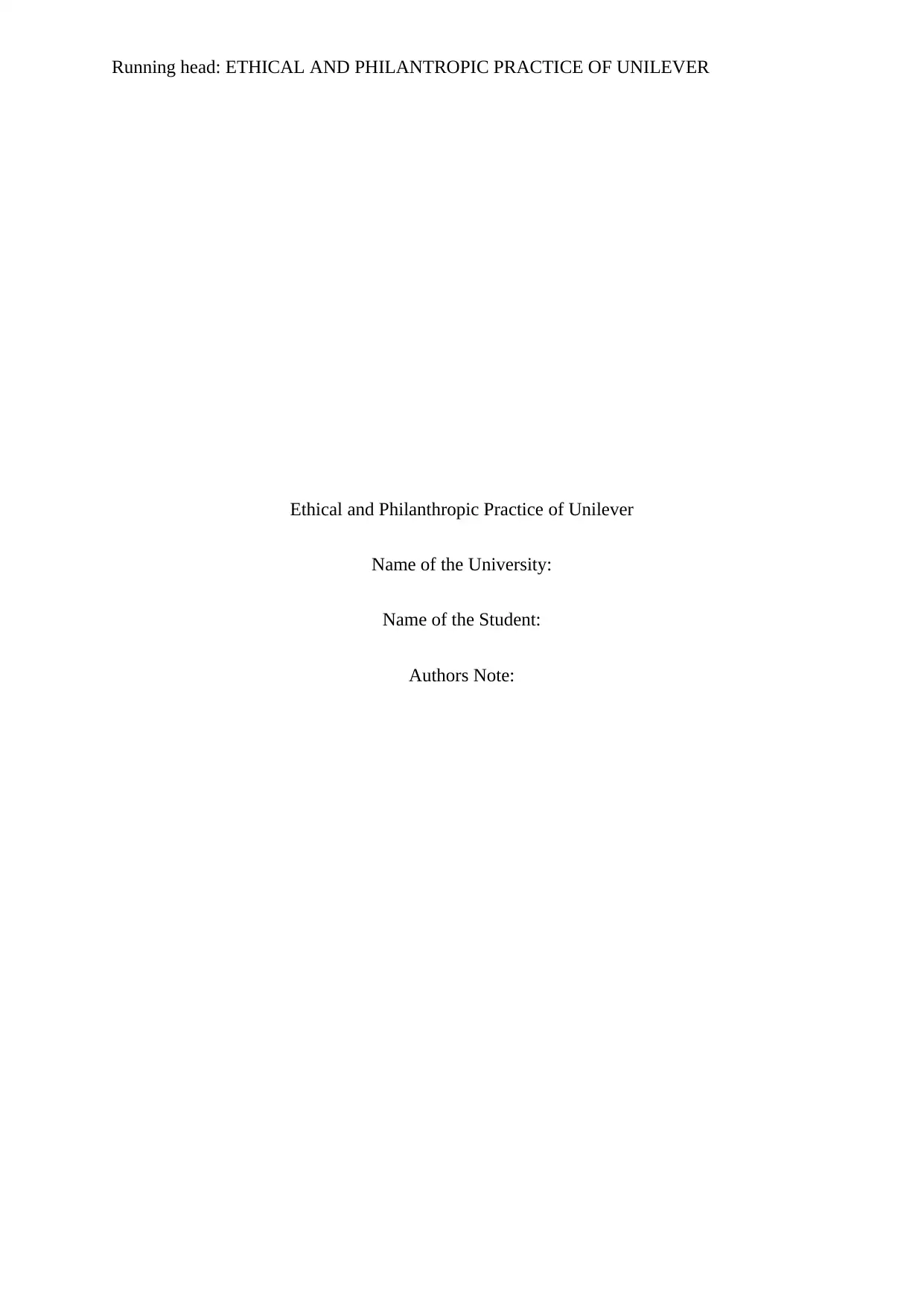
Running head: ETHICAL AND PHILANTROPIC PRACTICE OF UNILEVER
Ethical and Philanthropic Practice of Unilever
Name of the University:
Name of the Student:
Authors Note:
Ethical and Philanthropic Practice of Unilever
Name of the University:
Name of the Student:
Authors Note:
Paraphrase This Document
Need a fresh take? Get an instant paraphrase of this document with our AI Paraphraser
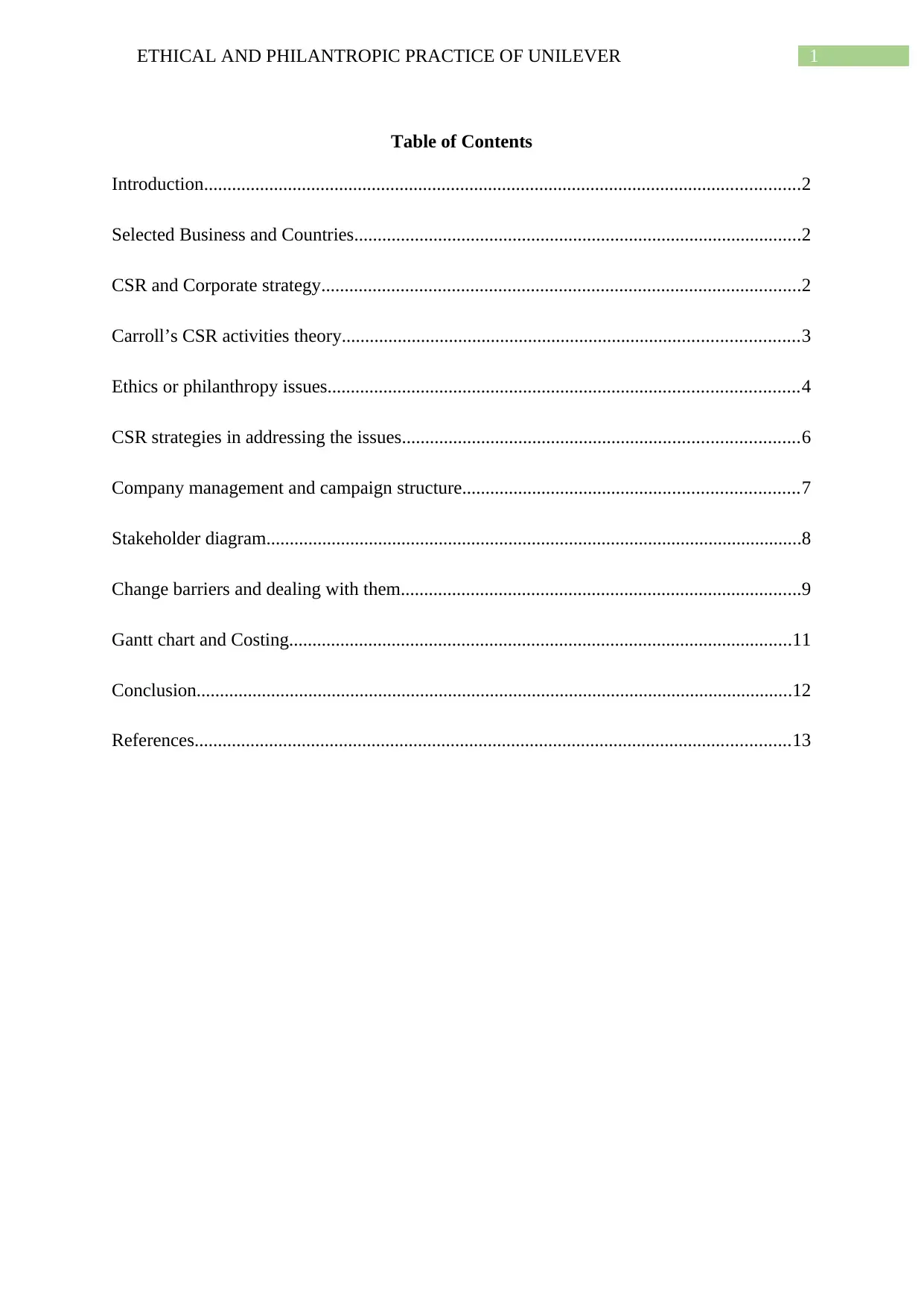
1ETHICAL AND PHILANTROPIC PRACTICE OF UNILEVER
Table of Contents
Introduction................................................................................................................................2
Selected Business and Countries................................................................................................2
CSR and Corporate strategy.......................................................................................................2
Carroll’s CSR activities theory..................................................................................................3
Ethics or philanthropy issues.....................................................................................................4
CSR strategies in addressing the issues.....................................................................................6
Company management and campaign structure........................................................................7
Stakeholder diagram...................................................................................................................8
Change barriers and dealing with them......................................................................................9
Gantt chart and Costing............................................................................................................11
Conclusion................................................................................................................................12
References................................................................................................................................13
Table of Contents
Introduction................................................................................................................................2
Selected Business and Countries................................................................................................2
CSR and Corporate strategy.......................................................................................................2
Carroll’s CSR activities theory..................................................................................................3
Ethics or philanthropy issues.....................................................................................................4
CSR strategies in addressing the issues.....................................................................................6
Company management and campaign structure........................................................................7
Stakeholder diagram...................................................................................................................8
Change barriers and dealing with them......................................................................................9
Gantt chart and Costing............................................................................................................11
Conclusion................................................................................................................................12
References................................................................................................................................13
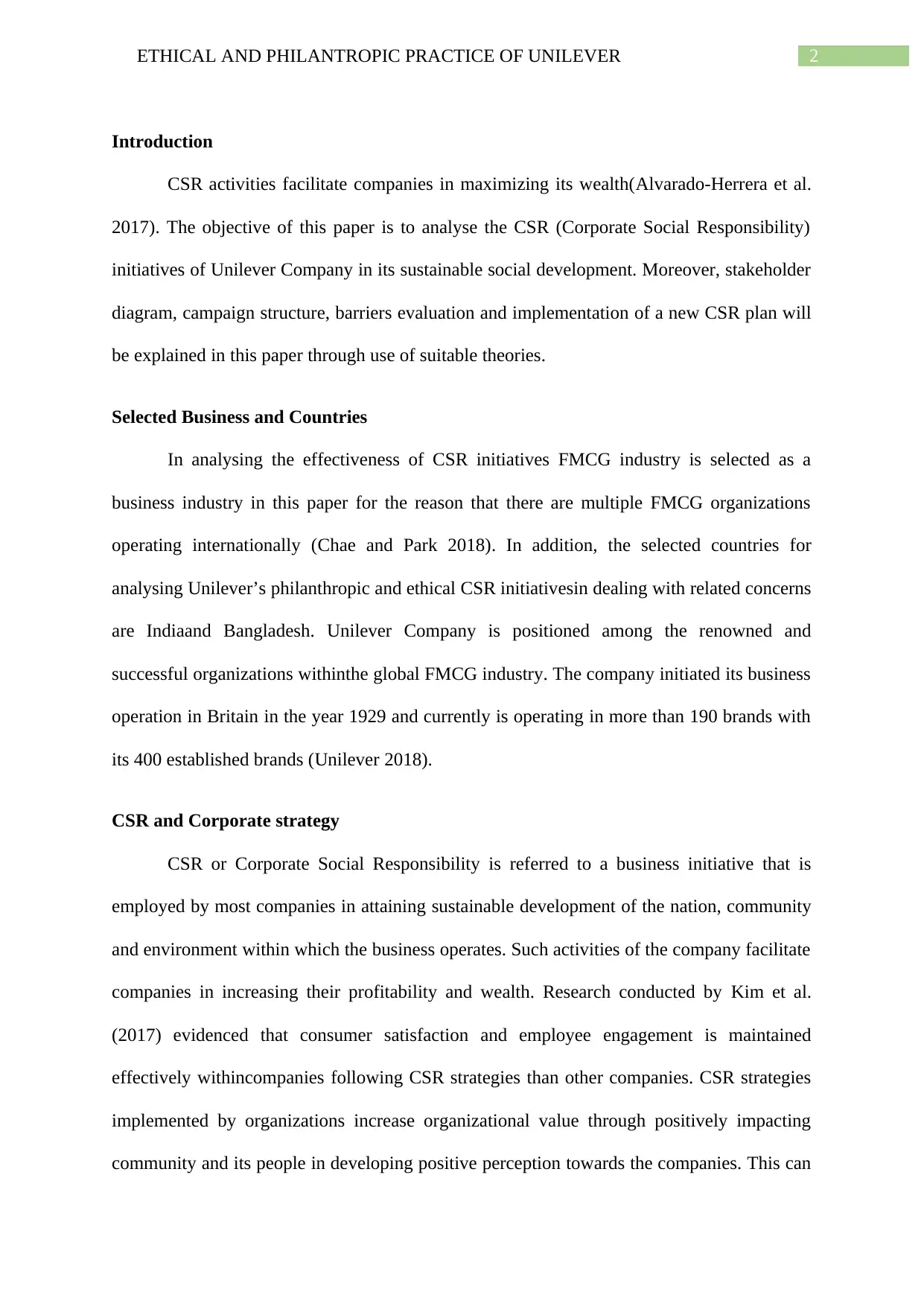
2ETHICAL AND PHILANTROPIC PRACTICE OF UNILEVER
Introduction
CSR activities facilitate companies in maximizing its wealth(Alvarado-Herrera et al.
2017). The objective of this paper is to analyse the CSR (Corporate Social Responsibility)
initiatives of Unilever Company in its sustainable social development. Moreover, stakeholder
diagram, campaign structure, barriers evaluation and implementation of a new CSR plan will
be explained in this paper through use of suitable theories.
Selected Business and Countries
In analysing the effectiveness of CSR initiatives FMCG industry is selected as a
business industry in this paper for the reason that there are multiple FMCG organizations
operating internationally (Chae and Park 2018). In addition, the selected countries for
analysing Unilever’s philanthropic and ethical CSR initiativesin dealing with related concerns
are Indiaand Bangladesh. Unilever Company is positioned among the renowned and
successful organizations withinthe global FMCG industry. The company initiated its business
operation in Britain in the year 1929 and currently is operating in more than 190 brands with
its 400 established brands (Unilever 2018).
CSR and Corporate strategy
CSR or Corporate Social Responsibility is referred to a business initiative that is
employed by most companies in attaining sustainable development of the nation, community
and environment within which the business operates. Such activities of the company facilitate
companies in increasing their profitability and wealth. Research conducted by Kim et al.
(2017) evidenced that consumer satisfaction and employee engagement is maintained
effectively withincompanies following CSR strategies than other companies. CSR strategies
implemented by organizations increase organizational value through positively impacting
community and its people in developing positive perception towards the companies. This can
Introduction
CSR activities facilitate companies in maximizing its wealth(Alvarado-Herrera et al.
2017). The objective of this paper is to analyse the CSR (Corporate Social Responsibility)
initiatives of Unilever Company in its sustainable social development. Moreover, stakeholder
diagram, campaign structure, barriers evaluation and implementation of a new CSR plan will
be explained in this paper through use of suitable theories.
Selected Business and Countries
In analysing the effectiveness of CSR initiatives FMCG industry is selected as a
business industry in this paper for the reason that there are multiple FMCG organizations
operating internationally (Chae and Park 2018). In addition, the selected countries for
analysing Unilever’s philanthropic and ethical CSR initiativesin dealing with related concerns
are Indiaand Bangladesh. Unilever Company is positioned among the renowned and
successful organizations withinthe global FMCG industry. The company initiated its business
operation in Britain in the year 1929 and currently is operating in more than 190 brands with
its 400 established brands (Unilever 2018).
CSR and Corporate strategy
CSR or Corporate Social Responsibility is referred to a business initiative that is
employed by most companies in attaining sustainable development of the nation, community
and environment within which the business operates. Such activities of the company facilitate
companies in increasing their profitability and wealth. Research conducted by Kim et al.
(2017) evidenced that consumer satisfaction and employee engagement is maintained
effectively withincompanies following CSR strategies than other companies. CSR strategies
implemented by organizations increase organizational value through positively impacting
community and its people in developing positive perception towards the companies. This can
⊘ This is a preview!⊘
Do you want full access?
Subscribe today to unlock all pages.

Trusted by 1+ million students worldwide
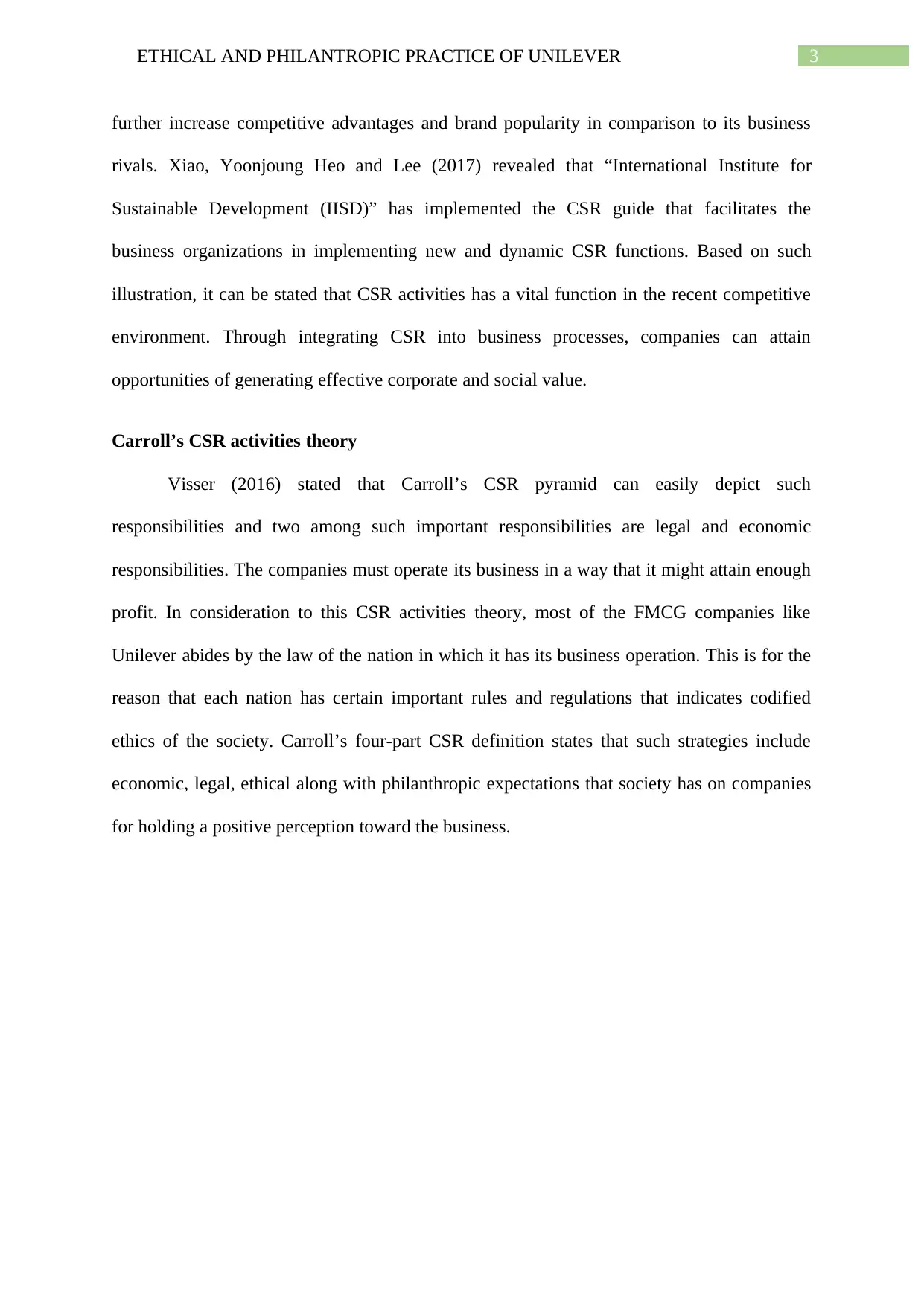
3ETHICAL AND PHILANTROPIC PRACTICE OF UNILEVER
further increase competitive advantages and brand popularity in comparison to its business
rivals. Xiao, Yoonjoung Heo and Lee (2017) revealed that “International Institute for
Sustainable Development (IISD)” has implemented the CSR guide that facilitates the
business organizations in implementing new and dynamic CSR functions. Based on such
illustration, it can be stated that CSR activities has a vital function in the recent competitive
environment. Through integrating CSR into business processes, companies can attain
opportunities of generating effective corporate and social value.
Carroll’s CSR activities theory
Visser (2016) stated that Carroll’s CSR pyramid can easily depict such
responsibilities and two among such important responsibilities are legal and economic
responsibilities. The companies must operate its business in a way that it might attain enough
profit. In consideration to this CSR activities theory, most of the FMCG companies like
Unilever abides by the law of the nation in which it has its business operation. This is for the
reason that each nation has certain important rules and regulations that indicates codified
ethics of the society. Carroll’s four-part CSR definition states that such strategies include
economic, legal, ethical along with philanthropic expectations that society has on companies
for holding a positive perception toward the business.
further increase competitive advantages and brand popularity in comparison to its business
rivals. Xiao, Yoonjoung Heo and Lee (2017) revealed that “International Institute for
Sustainable Development (IISD)” has implemented the CSR guide that facilitates the
business organizations in implementing new and dynamic CSR functions. Based on such
illustration, it can be stated that CSR activities has a vital function in the recent competitive
environment. Through integrating CSR into business processes, companies can attain
opportunities of generating effective corporate and social value.
Carroll’s CSR activities theory
Visser (2016) stated that Carroll’s CSR pyramid can easily depict such
responsibilities and two among such important responsibilities are legal and economic
responsibilities. The companies must operate its business in a way that it might attain enough
profit. In consideration to this CSR activities theory, most of the FMCG companies like
Unilever abides by the law of the nation in which it has its business operation. This is for the
reason that each nation has certain important rules and regulations that indicates codified
ethics of the society. Carroll’s four-part CSR definition states that such strategies include
economic, legal, ethical along with philanthropic expectations that society has on companies
for holding a positive perception toward the business.
Paraphrase This Document
Need a fresh take? Get an instant paraphrase of this document with our AI Paraphraser
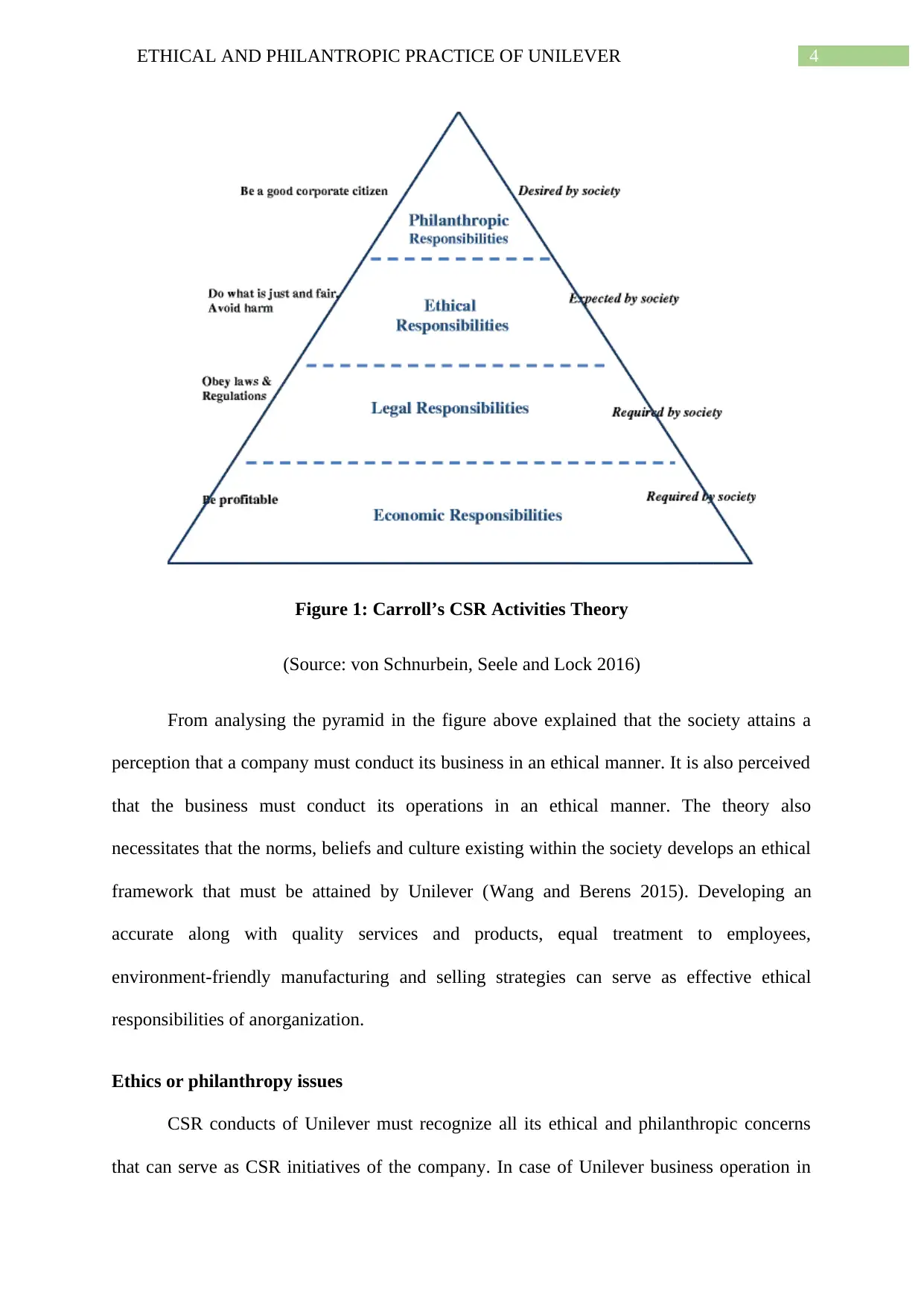
4ETHICAL AND PHILANTROPIC PRACTICE OF UNILEVER
Figure 1: Carroll’s CSR Activities Theory
(Source: von Schnurbein, Seele and Lock 2016)
From analysing the pyramid in the figure above explained that the society attains a
perception that a company must conduct its business in an ethical manner. It is also perceived
that the business must conduct its operations in an ethical manner. The theory also
necessitates that the norms, beliefs and culture existing within the society develops an ethical
framework that must be attained by Unilever (Wang and Berens 2015). Developing an
accurate along with quality services and products, equal treatment to employees,
environment-friendly manufacturing and selling strategies can serve as effective ethical
responsibilities of anorganization.
Ethics or philanthropy issues
CSR conducts of Unilever must recognize all its ethical and philanthropic concerns
that can serve as CSR initiatives of the company. In case of Unilever business operation in
Figure 1: Carroll’s CSR Activities Theory
(Source: von Schnurbein, Seele and Lock 2016)
From analysing the pyramid in the figure above explained that the society attains a
perception that a company must conduct its business in an ethical manner. It is also perceived
that the business must conduct its operations in an ethical manner. The theory also
necessitates that the norms, beliefs and culture existing within the society develops an ethical
framework that must be attained by Unilever (Wang and Berens 2015). Developing an
accurate along with quality services and products, equal treatment to employees,
environment-friendly manufacturing and selling strategies can serve as effective ethical
responsibilities of anorganization.
Ethics or philanthropy issues
CSR conducts of Unilever must recognize all its ethical and philanthropic concerns
that can serve as CSR initiatives of the company. In case of Unilever business operation in
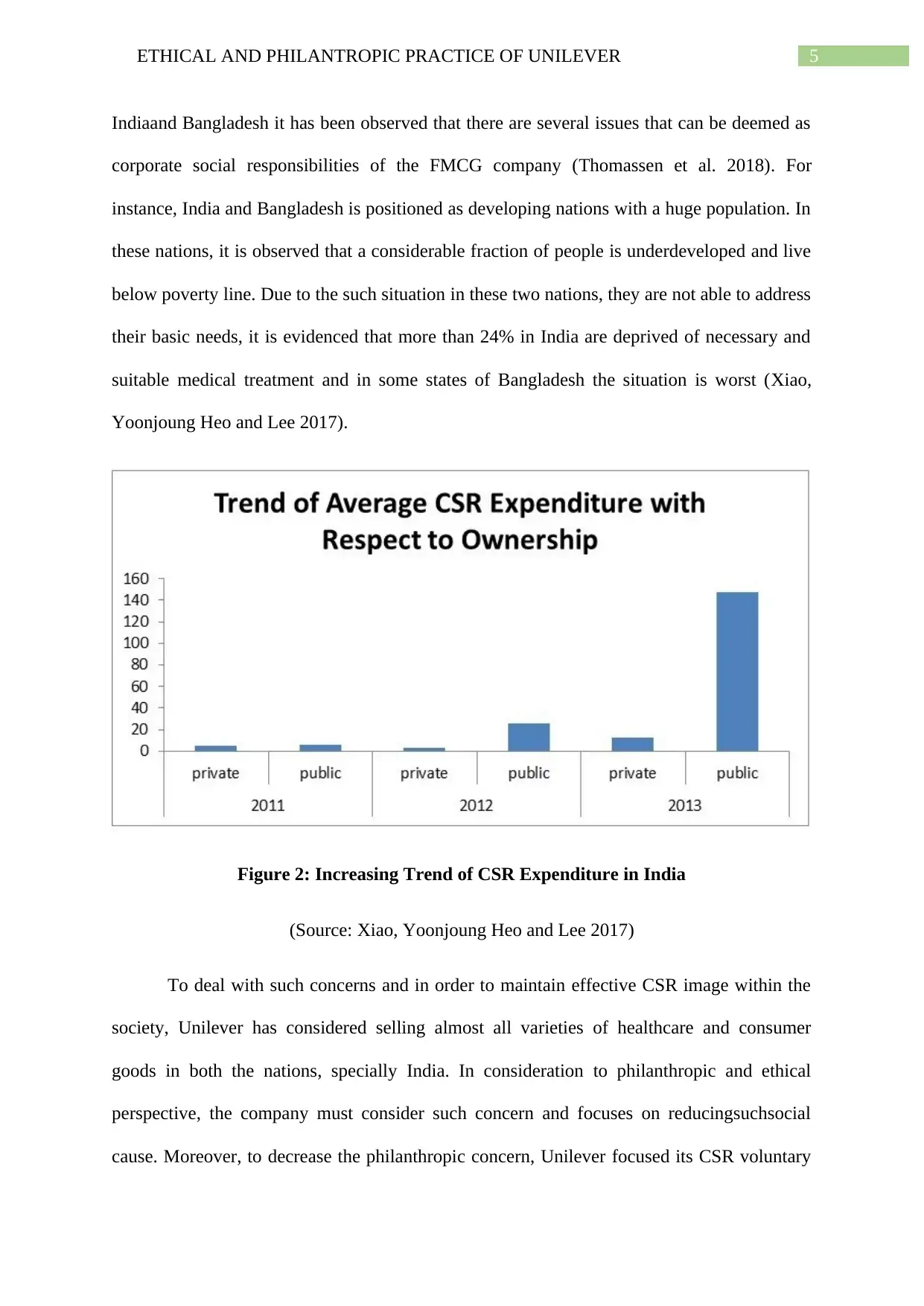
5ETHICAL AND PHILANTROPIC PRACTICE OF UNILEVER
Indiaand Bangladesh it has been observed that there are several issues that can be deemed as
corporate social responsibilities of the FMCG company (Thomassen et al. 2018). For
instance, India and Bangladesh is positioned as developing nations with a huge population. In
these nations, it is observed that a considerable fraction of people is underdeveloped and live
below poverty line. Due to the such situation in these two nations, they are not able to address
their basic needs, it is evidenced that more than 24% in India are deprived of necessary and
suitable medical treatment and in some states of Bangladesh the situation is worst (Xiao,
Yoonjoung Heo and Lee 2017).
Figure 2: Increasing Trend of CSR Expenditure in India
(Source: Xiao, Yoonjoung Heo and Lee 2017)
To deal with such concerns and in order to maintain effective CSR image within the
society, Unilever has considered selling almost all varieties of healthcare and consumer
goods in both the nations, specially India. In consideration to philanthropic and ethical
perspective, the company must consider such concern and focuses on reducingsuchsocial
cause. Moreover, to decrease the philanthropic concern, Unilever focused its CSR voluntary
Indiaand Bangladesh it has been observed that there are several issues that can be deemed as
corporate social responsibilities of the FMCG company (Thomassen et al. 2018). For
instance, India and Bangladesh is positioned as developing nations with a huge population. In
these nations, it is observed that a considerable fraction of people is underdeveloped and live
below poverty line. Due to the such situation in these two nations, they are not able to address
their basic needs, it is evidenced that more than 24% in India are deprived of necessary and
suitable medical treatment and in some states of Bangladesh the situation is worst (Xiao,
Yoonjoung Heo and Lee 2017).
Figure 2: Increasing Trend of CSR Expenditure in India
(Source: Xiao, Yoonjoung Heo and Lee 2017)
To deal with such concerns and in order to maintain effective CSR image within the
society, Unilever has considered selling almost all varieties of healthcare and consumer
goods in both the nations, specially India. In consideration to philanthropic and ethical
perspective, the company must consider such concern and focuses on reducingsuchsocial
cause. Moreover, to decrease the philanthropic concern, Unilever focused its CSR voluntary
⊘ This is a preview!⊘
Do you want full access?
Subscribe today to unlock all pages.

Trusted by 1+ million students worldwide
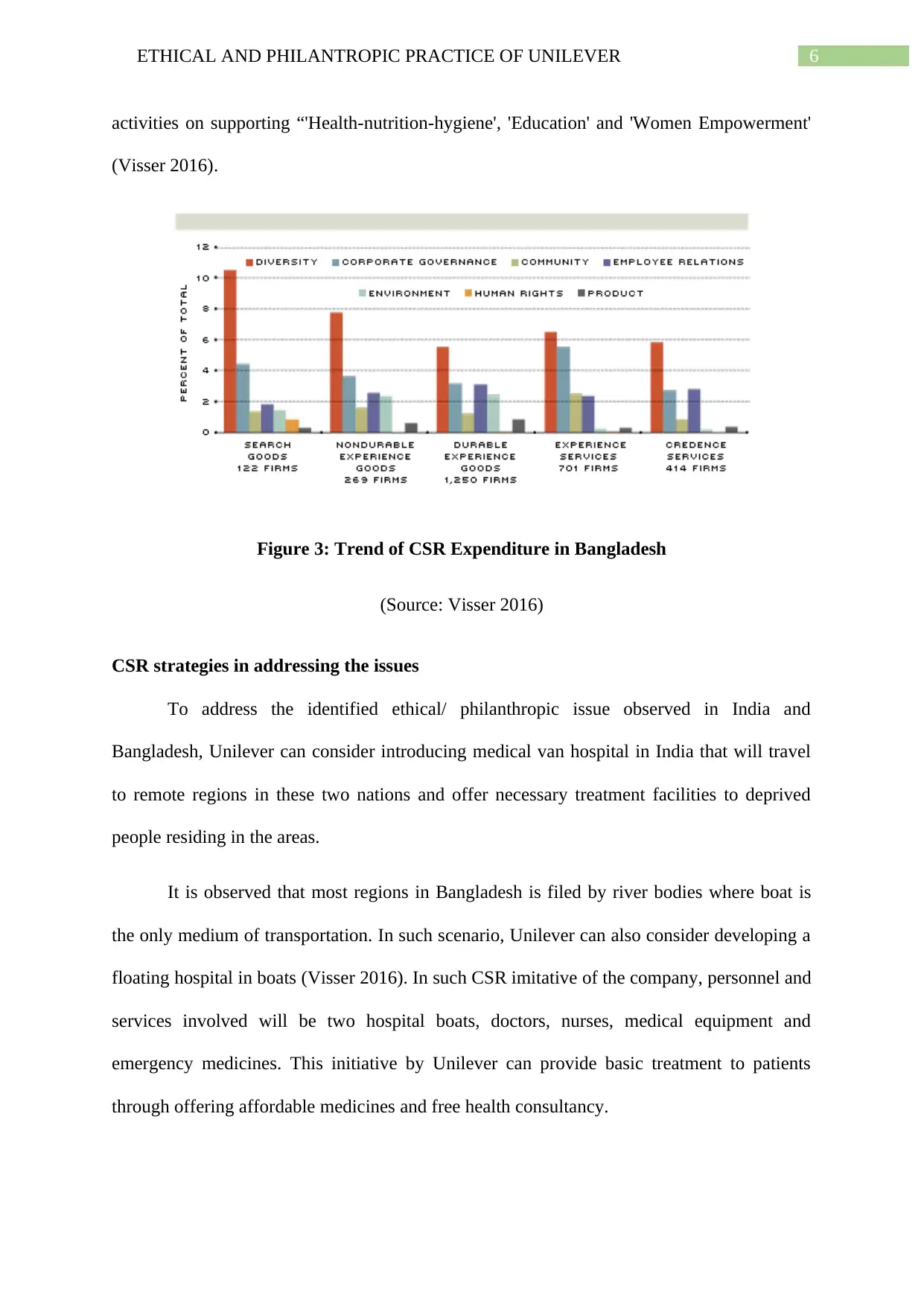
6ETHICAL AND PHILANTROPIC PRACTICE OF UNILEVER
activities on supporting “'Health-nutrition-hygiene', 'Education' and 'Women Empowerment'
(Visser 2016).
Figure 3: Trend of CSR Expenditure in Bangladesh
(Source: Visser 2016)
CSR strategies in addressing the issues
To address the identified ethical/ philanthropic issue observed in India and
Bangladesh, Unilever can consider introducing medical van hospital in India that will travel
to remote regions in these two nations and offer necessary treatment facilities to deprived
people residing in the areas.
It is observed that most regions in Bangladesh is filed by river bodies where boat is
the only medium of transportation. In such scenario, Unilever can also consider developing a
floating hospital in boats (Visser 2016). In such CSR imitative of the company, personnel and
services involved will be two hospital boats, doctors, nurses, medical equipment and
emergency medicines. This initiative by Unilever can provide basic treatment to patients
through offering affordable medicines and free health consultancy.
activities on supporting “'Health-nutrition-hygiene', 'Education' and 'Women Empowerment'
(Visser 2016).
Figure 3: Trend of CSR Expenditure in Bangladesh
(Source: Visser 2016)
CSR strategies in addressing the issues
To address the identified ethical/ philanthropic issue observed in India and
Bangladesh, Unilever can consider introducing medical van hospital in India that will travel
to remote regions in these two nations and offer necessary treatment facilities to deprived
people residing in the areas.
It is observed that most regions in Bangladesh is filed by river bodies where boat is
the only medium of transportation. In such scenario, Unilever can also consider developing a
floating hospital in boats (Visser 2016). In such CSR imitative of the company, personnel and
services involved will be two hospital boats, doctors, nurses, medical equipment and
emergency medicines. This initiative by Unilever can provide basic treatment to patients
through offering affordable medicines and free health consultancy.
Paraphrase This Document
Need a fresh take? Get an instant paraphrase of this document with our AI Paraphraser
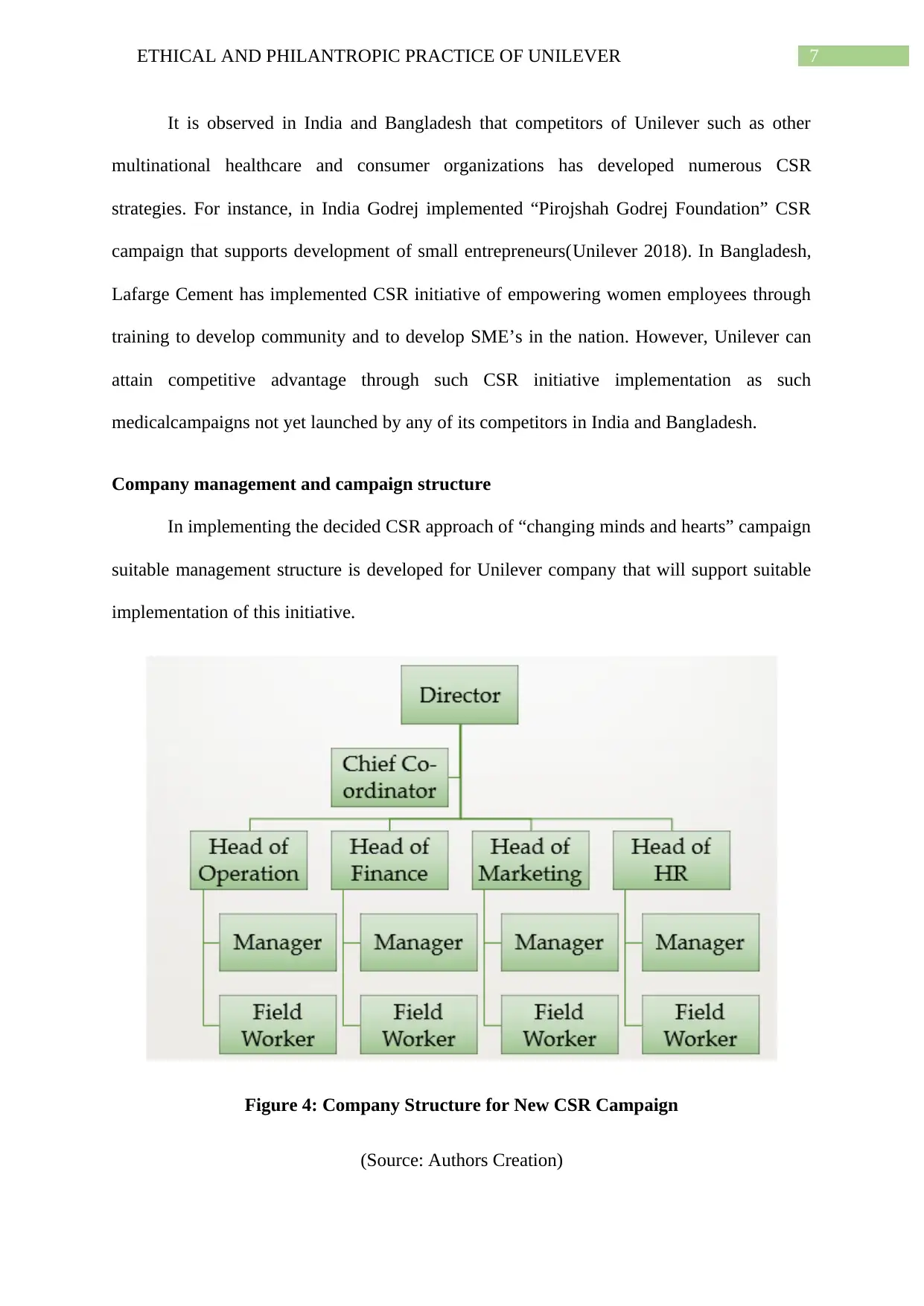
7ETHICAL AND PHILANTROPIC PRACTICE OF UNILEVER
It is observed in India and Bangladesh that competitors of Unilever such as other
multinational healthcare and consumer organizations has developed numerous CSR
strategies. For instance, in India Godrej implemented “Pirojshah Godrej Foundation” CSR
campaign that supports development of small entrepreneurs(Unilever 2018). In Bangladesh,
Lafarge Cement has implemented CSR initiative of empowering women employees through
training to develop community and to develop SME’s in the nation. However, Unilever can
attain competitive advantage through such CSR initiative implementation as such
medicalcampaigns not yet launched by any of its competitors in India and Bangladesh.
Company management and campaign structure
In implementing the decided CSR approach of “changing minds and hearts” campaign
suitable management structure is developed for Unilever company that will support suitable
implementation of this initiative.
Figure 4: Company Structure for New CSR Campaign
(Source: Authors Creation)
It is observed in India and Bangladesh that competitors of Unilever such as other
multinational healthcare and consumer organizations has developed numerous CSR
strategies. For instance, in India Godrej implemented “Pirojshah Godrej Foundation” CSR
campaign that supports development of small entrepreneurs(Unilever 2018). In Bangladesh,
Lafarge Cement has implemented CSR initiative of empowering women employees through
training to develop community and to develop SME’s in the nation. However, Unilever can
attain competitive advantage through such CSR initiative implementation as such
medicalcampaigns not yet launched by any of its competitors in India and Bangladesh.
Company management and campaign structure
In implementing the decided CSR approach of “changing minds and hearts” campaign
suitable management structure is developed for Unilever company that will support suitable
implementation of this initiative.
Figure 4: Company Structure for New CSR Campaign
(Source: Authors Creation)
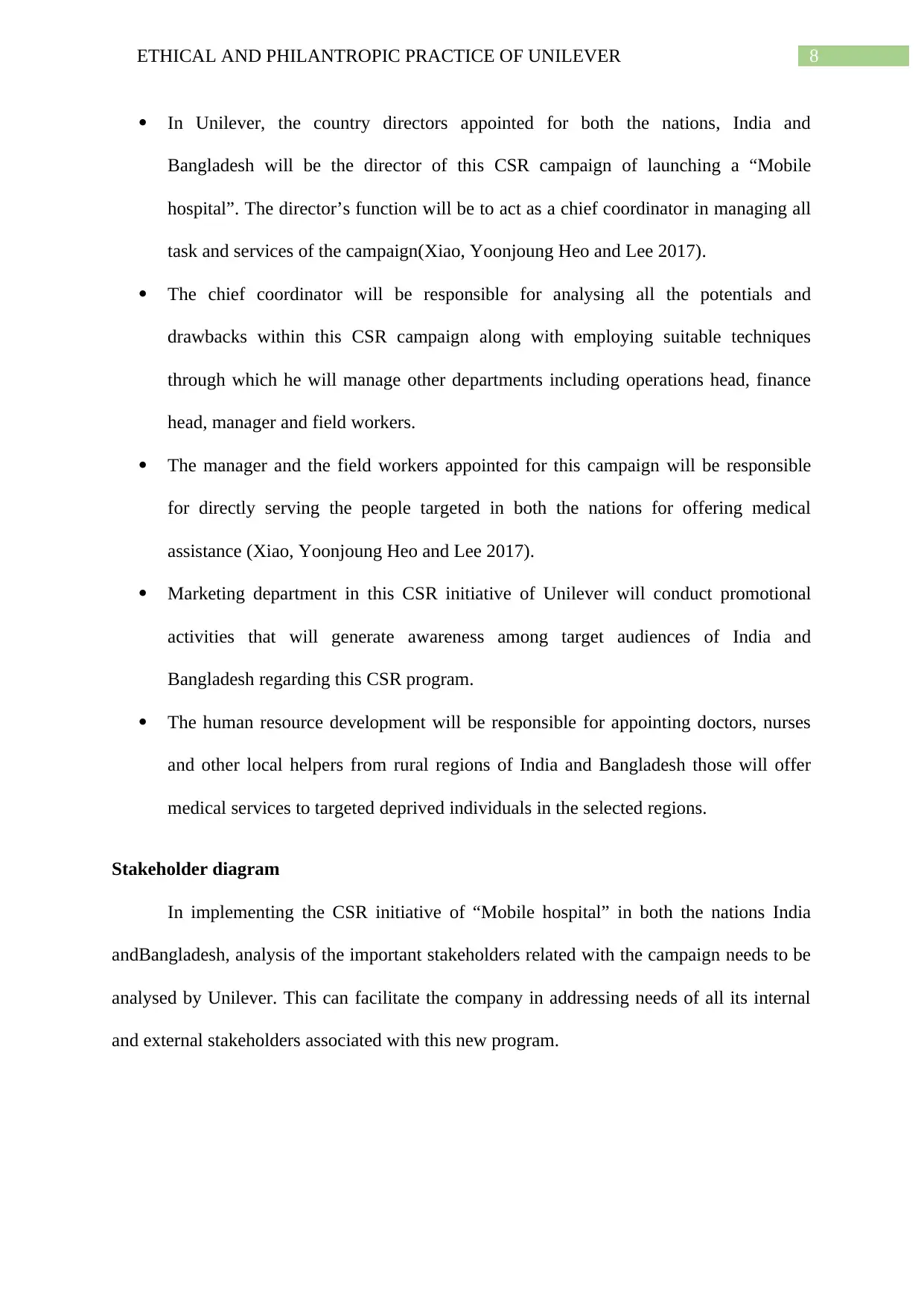
8ETHICAL AND PHILANTROPIC PRACTICE OF UNILEVER
In Unilever, the country directors appointed for both the nations, India and
Bangladesh will be the director of this CSR campaign of launching a “Mobile
hospital”. The director’s function will be to act as a chief coordinator in managing all
task and services of the campaign(Xiao, Yoonjoung Heo and Lee 2017).
The chief coordinator will be responsible for analysing all the potentials and
drawbacks within this CSR campaign along with employing suitable techniques
through which he will manage other departments including operations head, finance
head, manager and field workers.
The manager and the field workers appointed for this campaign will be responsible
for directly serving the people targeted in both the nations for offering medical
assistance (Xiao, Yoonjoung Heo and Lee 2017).
Marketing department in this CSR initiative of Unilever will conduct promotional
activities that will generate awareness among target audiences of India and
Bangladesh regarding this CSR program.
The human resource development will be responsible for appointing doctors, nurses
and other local helpers from rural regions of India and Bangladesh those will offer
medical services to targeted deprived individuals in the selected regions.
Stakeholder diagram
In implementing the CSR initiative of “Mobile hospital” in both the nations India
andBangladesh, analysis of the important stakeholders related with the campaign needs to be
analysed by Unilever. This can facilitate the company in addressing needs of all its internal
and external stakeholders associated with this new program.
In Unilever, the country directors appointed for both the nations, India and
Bangladesh will be the director of this CSR campaign of launching a “Mobile
hospital”. The director’s function will be to act as a chief coordinator in managing all
task and services of the campaign(Xiao, Yoonjoung Heo and Lee 2017).
The chief coordinator will be responsible for analysing all the potentials and
drawbacks within this CSR campaign along with employing suitable techniques
through which he will manage other departments including operations head, finance
head, manager and field workers.
The manager and the field workers appointed for this campaign will be responsible
for directly serving the people targeted in both the nations for offering medical
assistance (Xiao, Yoonjoung Heo and Lee 2017).
Marketing department in this CSR initiative of Unilever will conduct promotional
activities that will generate awareness among target audiences of India and
Bangladesh regarding this CSR program.
The human resource development will be responsible for appointing doctors, nurses
and other local helpers from rural regions of India and Bangladesh those will offer
medical services to targeted deprived individuals in the selected regions.
Stakeholder diagram
In implementing the CSR initiative of “Mobile hospital” in both the nations India
andBangladesh, analysis of the important stakeholders related with the campaign needs to be
analysed by Unilever. This can facilitate the company in addressing needs of all its internal
and external stakeholders associated with this new program.
⊘ This is a preview!⊘
Do you want full access?
Subscribe today to unlock all pages.

Trusted by 1+ million students worldwide
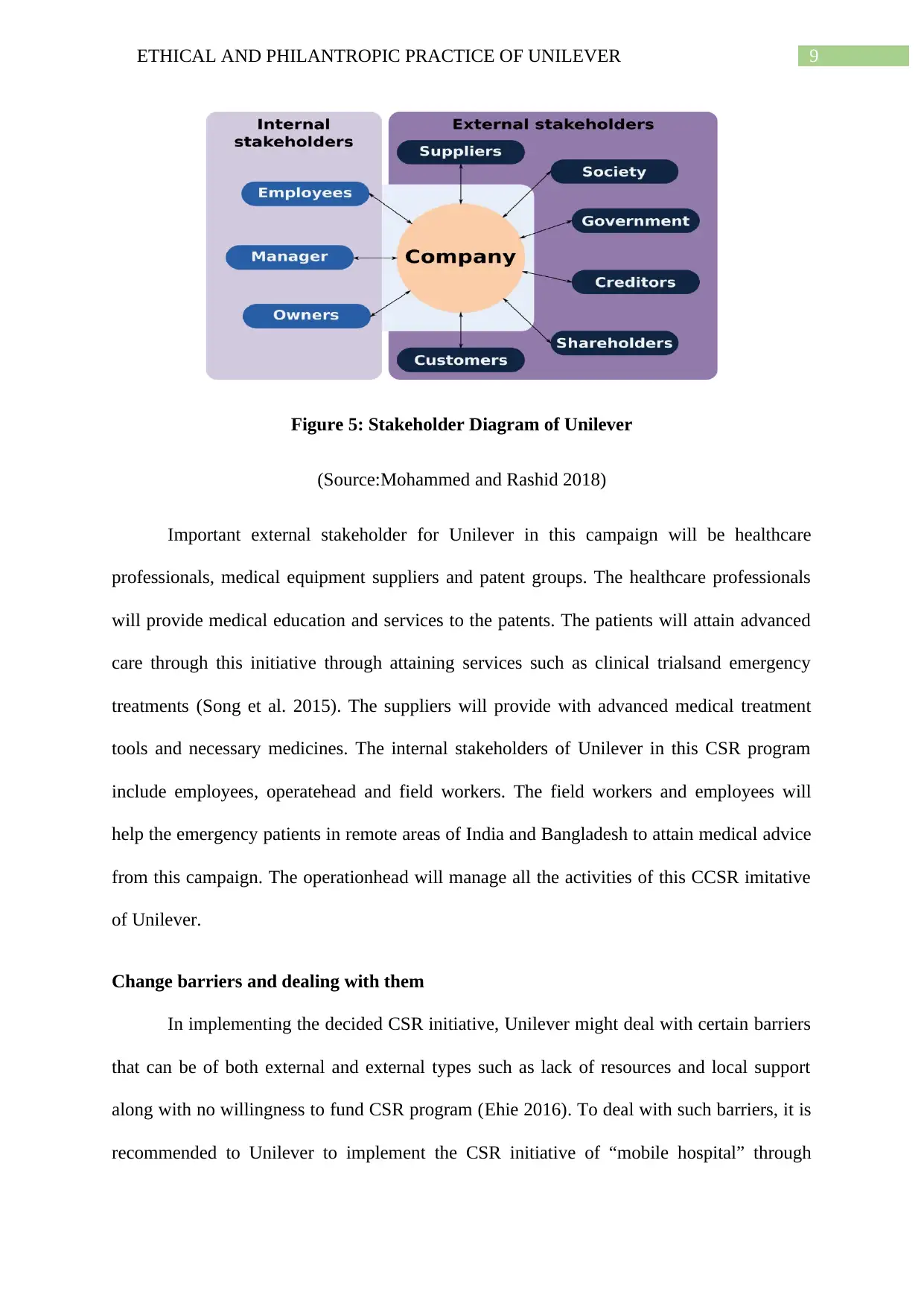
9ETHICAL AND PHILANTROPIC PRACTICE OF UNILEVER
Figure 5: Stakeholder Diagram of Unilever
(Source:Mohammed and Rashid 2018)
Important external stakeholder for Unilever in this campaign will be healthcare
professionals, medical equipment suppliers and patent groups. The healthcare professionals
will provide medical education and services to the patents. The patients will attain advanced
care through this initiative through attaining services such as clinical trialsand emergency
treatments (Song et al. 2015). The suppliers will provide with advanced medical treatment
tools and necessary medicines. The internal stakeholders of Unilever in this CSR program
include employees, operatehead and field workers. The field workers and employees will
help the emergency patients in remote areas of India and Bangladesh to attain medical advice
from this campaign. The operationhead will manage all the activities of this CCSR imitative
of Unilever.
Change barriers and dealing with them
In implementing the decided CSR initiative, Unilever might deal with certain barriers
that can be of both external and external types such as lack of resources and local support
along with no willingness to fund CSR program (Ehie 2016). To deal with such barriers, it is
recommended to Unilever to implement the CSR initiative of “mobile hospital” through
Figure 5: Stakeholder Diagram of Unilever
(Source:Mohammed and Rashid 2018)
Important external stakeholder for Unilever in this campaign will be healthcare
professionals, medical equipment suppliers and patent groups. The healthcare professionals
will provide medical education and services to the patents. The patients will attain advanced
care through this initiative through attaining services such as clinical trialsand emergency
treatments (Song et al. 2015). The suppliers will provide with advanced medical treatment
tools and necessary medicines. The internal stakeholders of Unilever in this CSR program
include employees, operatehead and field workers. The field workers and employees will
help the emergency patients in remote areas of India and Bangladesh to attain medical advice
from this campaign. The operationhead will manage all the activities of this CCSR imitative
of Unilever.
Change barriers and dealing with them
In implementing the decided CSR initiative, Unilever might deal with certain barriers
that can be of both external and external types such as lack of resources and local support
along with no willingness to fund CSR program (Ehie 2016). To deal with such barriers, it is
recommended to Unilever to implement the CSR initiative of “mobile hospital” through
Paraphrase This Document
Need a fresh take? Get an instant paraphrase of this document with our AI Paraphraser
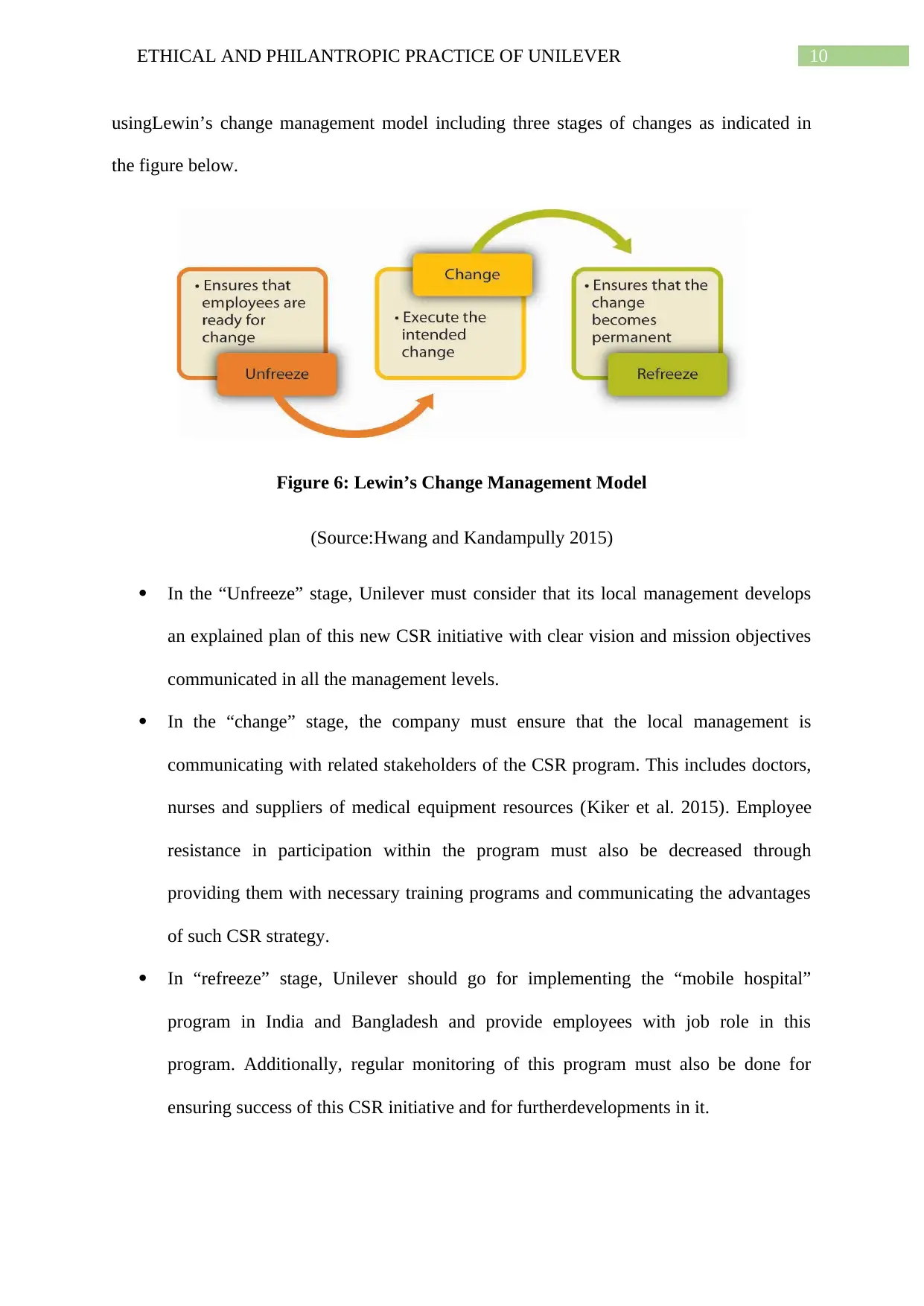
10ETHICAL AND PHILANTROPIC PRACTICE OF UNILEVER
usingLewin’s change management model including three stages of changes as indicated in
the figure below.
Figure 6: Lewin’s Change Management Model
(Source:Hwang and Kandampully 2015)
In the “Unfreeze” stage, Unilever must consider that its local management develops
an explained plan of this new CSR initiative with clear vision and mission objectives
communicated in all the management levels.
In the “change” stage, the company must ensure that the local management is
communicating with related stakeholders of the CSR program. This includes doctors,
nurses and suppliers of medical equipment resources (Kiker et al. 2015). Employee
resistance in participation within the program must also be decreased through
providing them with necessary training programs and communicating the advantages
of such CSR strategy.
In “refreeze” stage, Unilever should go for implementing the “mobile hospital”
program in India and Bangladesh and provide employees with job role in this
program. Additionally, regular monitoring of this program must also be done for
ensuring success of this CSR initiative and for furtherdevelopments in it.
usingLewin’s change management model including three stages of changes as indicated in
the figure below.
Figure 6: Lewin’s Change Management Model
(Source:Hwang and Kandampully 2015)
In the “Unfreeze” stage, Unilever must consider that its local management develops
an explained plan of this new CSR initiative with clear vision and mission objectives
communicated in all the management levels.
In the “change” stage, the company must ensure that the local management is
communicating with related stakeholders of the CSR program. This includes doctors,
nurses and suppliers of medical equipment resources (Kiker et al. 2015). Employee
resistance in participation within the program must also be decreased through
providing them with necessary training programs and communicating the advantages
of such CSR strategy.
In “refreeze” stage, Unilever should go for implementing the “mobile hospital”
program in India and Bangladesh and provide employees with job role in this
program. Additionally, regular monitoring of this program must also be done for
ensuring success of this CSR initiative and for furtherdevelopments in it.
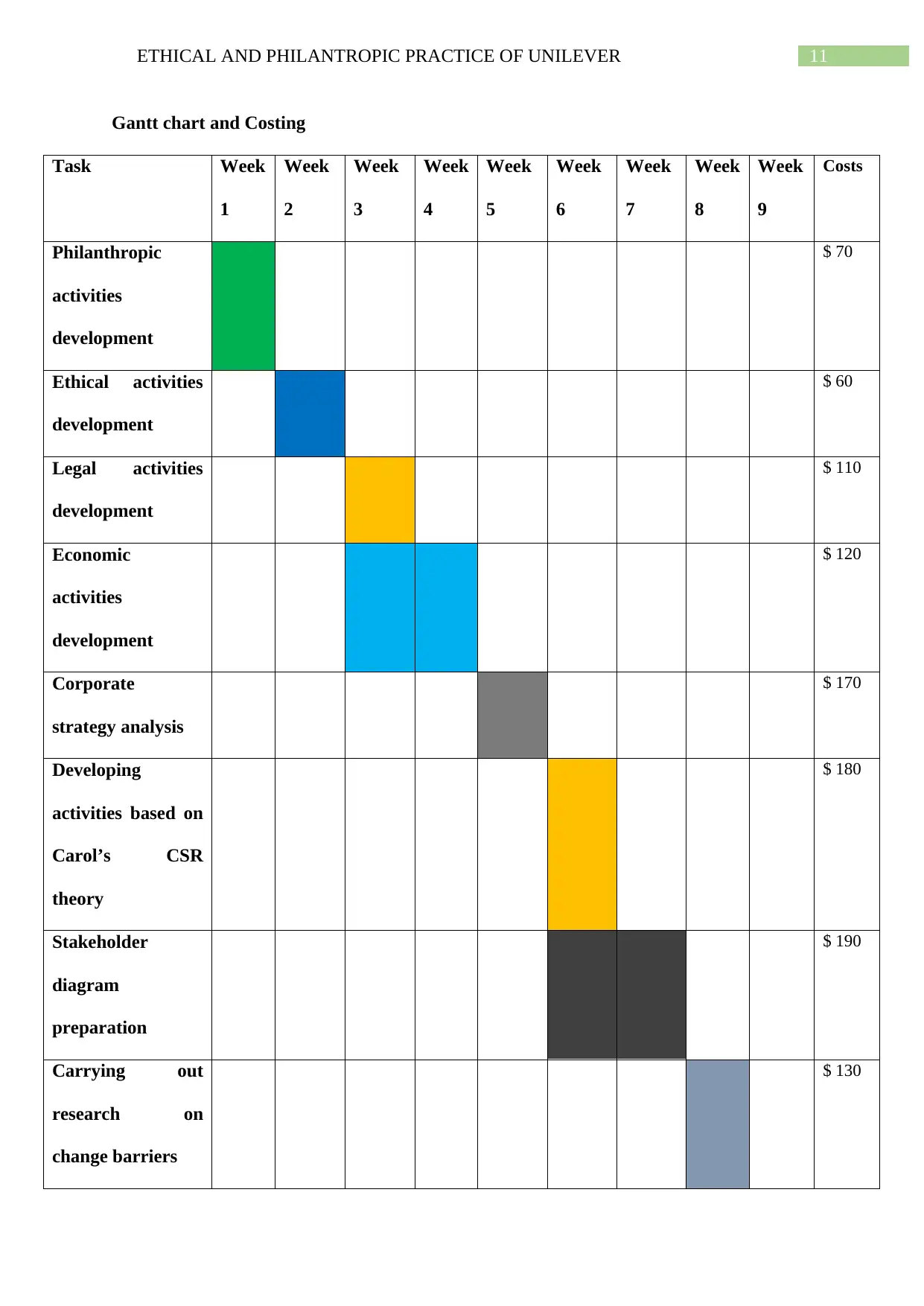
11ETHICAL AND PHILANTROPIC PRACTICE OF UNILEVER
Gantt chart and Costing
Task Week
1
Week
2
Week
3
Week
4
Week
5
Week
6
Week
7
Week
8
Week
9
Costs
Philanthropic
activities
development
$ 70
Ethical activities
development
$ 60
Legal activities
development
$ 110
Economic
activities
development
$ 120
Corporate
strategy analysis
$ 170
Developing
activities based on
Carol’s CSR
theory
$ 180
Stakeholder
diagram
preparation
$ 190
Carrying out
research on
change barriers
$ 130
Gantt chart and Costing
Task Week
1
Week
2
Week
3
Week
4
Week
5
Week
6
Week
7
Week
8
Week
9
Costs
Philanthropic
activities
development
$ 70
Ethical activities
development
$ 60
Legal activities
development
$ 110
Economic
activities
development
$ 120
Corporate
strategy analysis
$ 170
Developing
activities based on
Carol’s CSR
theory
$ 180
Stakeholder
diagram
preparation
$ 190
Carrying out
research on
change barriers
$ 130
⊘ This is a preview!⊘
Do you want full access?
Subscribe today to unlock all pages.

Trusted by 1+ million students worldwide
1 out of 15
Related Documents
Your All-in-One AI-Powered Toolkit for Academic Success.
+13062052269
info@desklib.com
Available 24*7 on WhatsApp / Email
![[object Object]](/_next/static/media/star-bottom.7253800d.svg)
Unlock your academic potential
Copyright © 2020–2026 A2Z Services. All Rights Reserved. Developed and managed by ZUCOL.





